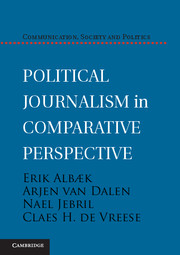Book contents
- Frontmatter
- Contents
- List of Tables and Figures
- Preface
- 1 Introduction
- 2 Comparing Political Journalism
- 3 Journalists
- 4 Journalists and Politicians
- 5 Do Role Conceptions Matter?
- 6 What Type of Journalism Produces Public Knowledge?
- 7 Does Infotainment Journalism Lead to Political Cynicism?
- 8 Good Journalism, Satisfied Citizens?
- 9 Political Journalism
- Appendix to Chapter 2
- Appendix to Chapter 3
- Appendix to Chapter 4
- Appendix to Chapter 5
- Appendix to Chapter 6
- Appendix to Chapter 7
- Appendix to Chapter 8
- References
- Index
4 - Journalists and Politicians
A Troubled Relationship?
Published online by Cambridge University Press: 05 June 2014
- Frontmatter
- Contents
- List of Tables and Figures
- Preface
- 1 Introduction
- 2 Comparing Political Journalism
- 3 Journalists
- 4 Journalists and Politicians
- 5 Do Role Conceptions Matter?
- 6 What Type of Journalism Produces Public Knowledge?
- 7 Does Infotainment Journalism Lead to Political Cynicism?
- 8 Good Journalism, Satisfied Citizens?
- 9 Political Journalism
- Appendix to Chapter 2
- Appendix to Chapter 3
- Appendix to Chapter 4
- Appendix to Chapter 5
- Appendix to Chapter 6
- Appendix to Chapter 7
- Appendix to Chapter 8
- References
- Index
Summary
In this chapter we move beyond journalists only and turn to the interaction between journalists and politicians. This interaction is often under scrutiny. Political news has been criticized for reinforcing what has come to be known as “the spiral of cynicism.” Because of negative reporting styles and cynical approaches toward politics, journalists are held responsible for decreasing levels of trust in government as well as increasing political cynicism among readers and viewers (Cappella & Jamieson, 1997; de Vreese, 2005). Critics condemn the “increasingly hostile and irresponsible tenor of political journalism” (Barnett in McNair, 2009, 244). Exposure to negatively framed news about politics is presumed to lessen not only trust but also political engagement (for example, see Patterson, 2000b). Empirical proof for this presumed causal relationship between negativity in political news and declining trust in politicians is, however, far from conclusive (see Adriaansen et al., 2011; Norris, 2000; de Vreese, 2005; Avery, 2009 for different findings). The impact of news on levels of trust seems to be contingent upon several factors; for instance, the type of news outlet, news content, and prior levels of trust.
Thus, evidence as to whether an increasingly negative reporting style influences voters’ attitudes is inconclusive. Studies in different European countries, however, have indeed shown some support for the claim that political news has become more critical – by using game frames and exposing the media strategies of politicians, for example (see Brants & Van Kempen, 2000 for the Netherlands; Schulz & Zeh, 2005 for Germany). Explanations for the negative framing of politics have been sought in commercial pressures (Patterson, 2000b), political PR, adversarial journalistic cultures (Esser & Spanjer, 2005), and differences in political and media systems (Strömbäck & Shehata, 2007, 800).
- Type
- Chapter
- Information
- Political Journalism in Comparative Perspective , pp. 52 - 71Publisher: Cambridge University PressPrint publication year: 2014
- 1
- Cited by

